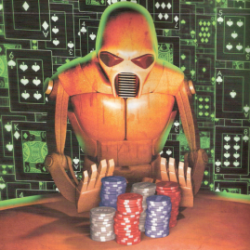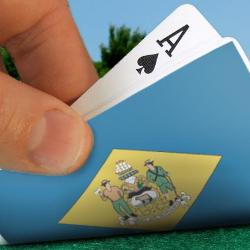Has Poker Just Become A Solved Game?

This week, computer scientist Michael Bowling and his team from the University of Alberta in Canada stunned the poker world by announcing that they have successfully built a computer program that plays perfect fixed-limit heads-up Texas Hold’em (HULHE), and is ‘essentially unbeatable’ by a human opponent. According to Bowling, their ultimate computer algorithm, named Cepheus, has now solved this particular variant of poker, and commenting on the incredible breakthrough, computer-poker researcher Eric Jackson, said the strategies the team developed are so close to perfect “as to render pointless further work on this game.”
A Solved Game
Other games have been solved in the past, such as checkers and tic-tac-toe, while computer programs have also been developed to partially solve the incredibly complicated game of chess, which has a huge number of possible permutations and combinations of moves. Unlike these board games, however, poker is a lot harder to solve as it is a game of incomplete information, making devising an optimal strategy far more difficult. Fixed-limit heads-up Texas Hold’em, for instance, is one of the simpler formats of the game to study, but still has 10,000 billion possible decision points, and needed over 10 terabytes of data to create a strategy grid to contain all the information. While this would imply it was probably impossible for a human to solve the game, this is precisely what the algorithm Cepheus has accomplished, and as Michael Bowling said:
“We define a game to be essentially solved if a lifetime of play is unable to statistically differentiate it from being solved at 95% confidence.. Even if you played 60 million hands of poker for 70 years, 12 hours a day, and never made any mistakes, you still wouldn’t be able to say with statistical confidence you were better than this program”
Optimal Strategy And Regret
During its training phase, the program collected a huge database of poker situations and decisions, which it then attached ‘regret’ values’ to related to how well or poorly each decision fared. As Michael Bowling explains, the algorithm is then able to frame its decisions by computing that “regret number for every single action.. so, every time it plays a hand, the program shifts its strategy so that it starts to do what it regretted not doing in past games more often.”
Elaborating further, Bowling said his team at the University of Alberta had developed a break-even strategy which guaranteed Cepheus would not lose, but would also ensure it would beat a player or other algorithm which made mistakes. The teams work has now been published in “Science” journal, with the scientists inviting poker players around the globe to test Cepheus at HULHE online.
Response From The Poker Pros
Responding to the remarkable development, poker player and AQR Capital chief risk officer Aaron Brown, said he was surprised Cepheus was able to win even though it had no interest in trying to figure out its opponent’s strategy and tactics.
“It would seem that one strategy shouldn’t beat all types of players, but it actually does. They have the strategy that beats everybody,” explained Brown.
Offering his opinion on the topic, acclaimed poker author and professional player David Sklansky said that while he was impressed by the team’s work, and even acknowledged Cepheus would beat him over time, he did believe that he would be make more money from a worse opponent than the computer could. As he explains:
“If the computer is playing a bad player, it will win, but it won’t win as quickly as a human being playing a bad player. I will destroy that beginner to a greater degree than this computer program will.”
Applications Beyond Poker
Cepheus has already advanced the strategy of fixed-limit heads-up Texas Hold’em, with the algorithm playing a wider range of hands than the pros, and placing bets with weaker holdings in certain situations where most pros would be more likely to just fold. However, the program has wider implications beyond the card game, and could have applications for game theory in general. As computer scientist Vincent Conitzer from Duke University in Durham, NC, explains:
“I think this is an exciting step that this paper makes, and I think it’s part of a broader development.. More and more we’re able to apply them [algorithms] directly to real-life games, whether they be poker or these kinds of strategic situations that come up in security.”
This is because the game mirrors situation in real-life where people have to make decisions based upon the incomplete information available to them, and so Cepheus may help humans devise ways in which to organize more efficiently such areas as coast guard patrols, airport security, or even health care.










